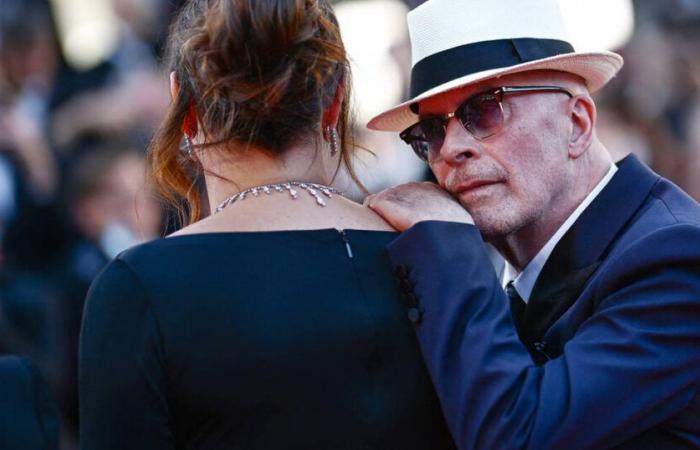Jacques Audiard’s Mexican musical comedy wins four awards, but the French filmmaker does not win the prize for best director which goes to Brady Corbet for his fresco of more than three hours with Andrian Brody in the role of an architect who survived the Shoah.
Last night in Los Angeles, the 82nd Golden Globes ceremony opened the ball for series and cinematographic award ceremonies, especially scrutinized because it serves as a waiting room for the Oscars. The constituencies of voters differ a lot – around 300 foreign journalists for the Globes, 9,900 film professionals for the Oscars – but the trends are emerging, particularly directing the less curious and rebellious Oscar voters when it comes to devouring films for next March. Seen from France and after the success there last year ofAnatomy of a Fall (best foreign film and screenplay), the event was above all a cocorico moment with the presence of the French Emilia Perez by Jacques Audiard (favorite with ten nominations) and The Substance by Coralie Fargeat (five nominations). Films of transformation (sex change for one, body horror for the other), also that of a globalized French cinema, Hollywood-en-Ile-de-France, where Audiard imports the stars Zoé Saldana and Selena Gomez in a reconstituted Mexico in Bry-sur-Marne while Fargeat invites Demi Moore and Margaret Qualley under the sunlight of Epinay-sur-Seine. A good omen for both at the Oscars, especially for Emilia Perezthe big winner having won the awards for best foreign film, best original song (The evil, co-written by Camille and Clément Ducol), best comedy or musical film and best supporting actress (Saldana) while Moore is crowned best actress for a comedy or musical (a mystery of the Golden Globes categories, but which has us at less valuable was a vibrant speech from the actress on ageism and this unexpected comeback). «So chic, so french», declared Saldana on stage to praise his filmmaker who, to prove that he has not been diluted by globalization, later gave the only non-English speech of the evening, celebrating the “sorority” and one “certain idea of unreason”.
A certain idea of auteurism
The idea of cinema to be rewarded for voters remained reasonable: the maximalist author in his vision (the American dream seen by a European emigrant, filming in Vistavision for 70 mm projections), in the person of The Brutalist by Brady Corbet, the other big winner of these Golden Globes (best dramatic film, best director, best actor for Adrien Brody, “twice survivor of the Shoah”, is the best joke, in reference to his role in the Pianist by Roman Polanski, of the good-willed but a little stressed presenter and stand-up artist Nikki Glaser). Having already received the Silver Lion for best direction at the Mostra, Corbet took the stage to defend a certain idea of auteurism against the standards of financial decision-makers and broadcasters: “The final cut is up to the director. I’m making a controversial statement when it shouldn’t be. I was told this film was undistributable. […]that no one would come to see him.” Fernanda Torres’ victory for the Brazilian I’m still here by Walter Salles, in front of Angelina Jolie (Maria, biopic of Maria Callas), Nicole Kidman (Baby Girl) or Kate Winslet (Lee Miller, biopic of the model-photographer), confirms the American centering and the representativeness of voters from 76 countries. Ditto in the best animated film category, where our favorite Latvian cat Flow by Gints Zilbalodis lady the pawn at Disney (Vice-Versa 2 et Vaiana 2) and thus puts the too discreet Baltic country at the forefront of the world cinematographic scene.
In the series section, spectators proceeded by following, comfort or pure and simple lack of time for binge viewing. Shogun thus continues its momentum since its harvest at the Emmy Awards, with approximately the same awards (best drama series, best drama actor for Hiroyuki Sanada, best drama actress for Anna Sawai), undoubtedly filling the void left by Game of Thrones with its armored battles, its reassuring exoticism and its court intrigues. Jeremy Allen White is again best actor in a musical or comedy series for The Bear while Jodie Foster is best actress in a mini-series, as a polar cop in season 4 of True Detective. My Little Reindeerwinner for best mini-series, best actor in a mini-series (Richard Gadd) and best supporting actress in a mini-series (Jessica Gunning), completed the crossover success of Netflix, broadcaster of the series but also ofEmilia Perez in the United States.
Trump as Voldemort never named
Otherwise, what did these Golden Globes say about our time? Its wise style was intended to be synchronous with our own perception of the world, saturated with useless information, with many anecdotes and information written in very small size on the screen and already forgotten (“Margaret Qualley has a collection of 2000 vintage dolls”), on the award presenters and the winners, geolocated in the room (for what? For the servers, for the security services?) as if Google Maps had sponsored the ceremony. And like Voldemort never named, not a single mention of Trump – barely a dig at Robert Kennedy Jr’s freezer – in the sketches and teleprompters read by the stars. It is up to Golden Globes voters to prepare us for 2025 by themselves shedding light on complicated election stories (the rout of cardinals in Conclavebest screenplay), monstrous mafioso (Colin Farrell, best actor in mini-series for The Penguin) and autocrats designating false enemies for popular vindictiveness (Wickedbest box office performance). Thanks to them.






